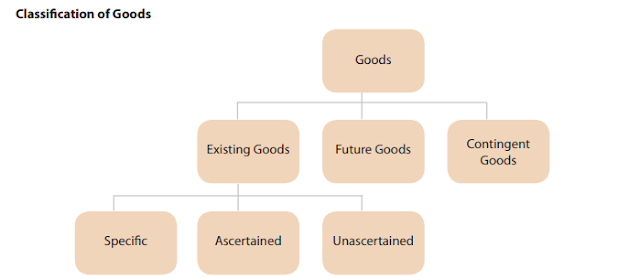Sales of Goods Act - Definition of Goods and Classification of goods
Introduction
Scope or subject matter of Sales of Goods act is "Goods". No exhaustive definition is provided which have enlisted all the goods. However definition is clear about what is included and what is excluded.
Further, judicial decision also lead clarity to what all kind of things are covered by Sales of Goods act.
First, it's important to understand WHY it's necessary to have solid definition for "Goods". First, State impose taxes when any transaction is carried out in "Goods". So to figure out if anything taxable or not, we need to find out whether it is "Goods" as per law. Second, there are certain rights and duties when transaction is done in "Goods". If you go to court about rights, first thing need be figured out is whether your transaction was in "Goods" as per act.
Definition
Section 2(7) defines goods as below:
"goods" means every kind of moveable property other than actionable claims and money; and includes stock and shares, growing crops, grass, and things attached to or forming part of the land which are agreed to be severed before sale or under the contract of sale;
Below points can be draw out from definition
- General definition includes any moveable property
- Moveable property mean property which you/machine can move and still be useful at another place where it is moved
- It includes certain things and excludes certain things. We will see those in bit details
- It includes Stock and Shares. You can transfer very easily shares to other people using demat.
Actionable Claim : It includes two things
- Unsecured debts
- Any beneficial interest in movable property, not in the possession of the claimant.
Money : Money is also specifically excluded from definition of "Goods". Imagine a transaction transfer of money in exchange of money. Isn't it a stupid transaction ?.
However, old currency would be deemed to be "Goods". If someone can buy antique old 1 ana coin it would be sale.
Is Water, electricity and Gas a good ?
Can you touch electricity or gas ? Though it looks like goods, of which possession cannot be taken like that of other things, it was considered to be a good.
Law Commission was of the opinion to include above things in definition of Goods. But In case of The Commissioner of Sales Tax, MP V MP electricity Board it was held that electricity is a good.
Some other things which are goods
- Lottery(Lootery) ticket is a good. It was held in H.Anraj V Govt of Tamil Nadu
- Interest of partner in partnership is a good. Held in Suhebram Surajmal V Purshottamlal Gopi Kishan, AIR 1950, Nag, 89
- Incomplete film is a good.
- Railway receipt is good.
- Vimal Pan Masala is good.but bad for health!!!
Classification of Goods
Exiting Goods : Which are owned or possessed by the seller at the time of making of contract. For example Manikchand, the Gutka maker have 1 Ton of Vimal Pan Masala in his godown.
Future Goods: Goods which are going to exists in future. For example, there is new phone launched named as "Ache Din", which will be available in future. This good will be future goods.
Contingent Goods: These goods are not certain. For example if Business man Adani says he will sell Gold to Bappi Lehri if he finds a gold in mine. After digging if Gold is found, then fine, if not then also fine. Such goods are contingent goods.
We can classify existing goods further in specific, ascertained and unascertained goods.
Specific Goods: These are goods which are identified by buyer at the time of contract of sale. For example you go to showroom and identify a particular bike or car. Important thing is these goods must be identified at the time of contract and not subsequently.
Unascertained goods: Unascertained goods are the goods which are not identified or ascertained at the time of making of the contract. They are indicated or de fined only by description or sample.
For example, If A agrees to sell to B one packet of salt out of the lot of one hundred packets lying in his shop, it is a sale of unascertained goods because it is not known which packet is to be delivered. As soon as a particular packet is separated from the lot, it becomes ascertained or specific goods.
Ascertained Goods: Ascertained Goods are those goods which are identified in accordance with the agreement after the contract of sale is made. This term is not defined in the Act but has been judicially interpreted. In actual practice the term ‘ascertained goods’ is used in the same sense as ‘specific goods.’ When from a lot or out of large quantity of unascertained goods, the number or quantity contracted for is identified, such identified goods are called ascertained goods.
This about definition of goods and types of goods.
Thanks,
Legalfundaa


Very well explained
ReplyDeletevery well explained good keep it up.
ReplyDeleteThank you.
ReplyDelete